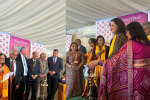Chipping Barnet MP Theresa Villiers has criticised UN organisations for excessive and disproportionate criticism of Israel when countries with poor human rights records receive little or no censure.
Speaking in an international Zoom panel discussion earlier this month on the effectiveness of the UN, Theresa said that since 2015, the UN General Assembly has adopted 96 condemnatory resolutions on Israel.
In the same time frame, Iran has received four, North Korea, five, there have been seven on Syria, just three on Myanmar and zero on China, Libya, Pakistan, and Zimbabwe, despite widespread human rights concerns in those countries.
“It’s depressing to see this longstanding problem continue with votes taking place as recently as last month,” she told the panel, which was part of this year’s online Leadership Dialogue 2020 conference.
“The 4th November vote in the UN Special Political and Decolonisation Committee of the UN General Assembly to back a resolution criticising Israel, which was co-sponsored by Syrian president Bashar Al Assad, was particularly shocking.
“To condemn Israel for its actions in relation to the Golan Heights is astonishing when one considers the appalling conduct of the Syrian regime across the border in the territory it controls.”
Theresa told the panel the UK Government has criticised the UN Human Rights Council’s bias against Israel. Ministers announced in 2017 they were putting the UN body “on notice” and they threatened to vote against every motion on the conflict unless the body ended its “disproportion and bias” against Israel.
However, she added it was frustrating UK delegations in various UN bodies continue sometimes to vote for these resolutions or at least abstain on them.
“I’ve had a long history of complaining about this and will continue to do so. I condemned the UK Government vote in favour of UN Security Council resolution 2234 in 2016 which was one of the most controversial and unbalanced of a series of problematic UN resolutions on Israel.
“Like other UN resolutions, 2234 made a negotiated settlement harder to achieve by trying to predetermine issues such as the governance of the holy sites in Jerusalem. The UN undermines its own effectiveness and credibility by taking this partisan approach.
“If the United Nations is ever going to be the universally-trusted forum for global cooperation and dispute resolution that it aspires to be then it urgently needs a fresh approach on the Middle East.”
Theresa added she warmly welcomed this year’s Abraham Accords. “They reflect changing attitudes across a number of countries in the Middle East. I hope this shift will see other countries follow the lead set by UAE, Bahrain and Sudan,” she said.
“And while there’s not much evidence of it so far, I hope that one day this thawing of relationships frozen for many years between the Arab world and Israel starts to influence the UN so it starts finally to give Israel a fair hearing.”
The Leadership Dialogue conference is usually held in Jerusalem but, due to Covid, it took place online with delegates from the UK, the US, Australia, Israel, the UAE, Singapore and Canada.


